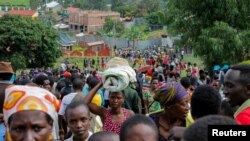Judicial officials and experts Africa’s Great Lakes region are meeting to look for ways to reduce violence and human rights abuses through the judicial process. The officials attending the meeting have called on closer cooperation between states to fight impunity in the region.
Judges, lawyers and legal experts are taking aim at impunity with hopes of finding a peaceful solution to conflicts in the Great Lakes region.
Tanzania's Deputy Director of Public Prosecution, Frederick Manyanda, spoke Wednesday in Dar es Salaam.
He says this meeting is about how to deal with those who commit crimes against humanity, how countries are going to engage in providing evidence, information and how they can exchange the suspected criminals. So, the one who is arrested in Zambia may be taken to Kenya and the one arrested in South Sudan taken to Tanzania.
This is the second time legal experts and lawyers from the region are meeting. The theme of this year’s meeting is to create mechanisms to strengthen regional cooperation.
The Great Lakes Judicial Cooperation network consists of 13 countries, four of which — Burundi, the Central African Republic, Democratic Republic of Congo and South Sudan — are engulfed in various degrees of violence and unrest. In all four, rights groups have accused governments and armed groups of human rights violations.
U.N. special envoy to the Great Lakes region Said Djinnit says for crimes to end, there has to be working agreements between countries in the region.
“The judicial cooperation has been highlighted as a very important tool for addressing impunity and promoting stability in the Great Lakes, a region that has been affected in the past with serious crisis, conflict, genocide, and war,” said Djinnit.
Constitutional law expert Nelson Havi says countries with well-developed judicial systems may find it difficult to work with countries whose judicial systems are weak.
"It will be foolhardy for a court in Tanzania or Kenya to use a suspect in one of those countries to be tried in Burundi or Uganda or Rwanda or even Southern Sudan, because it does not enjoy the same level of development and adherence to human rights. So this cooperation may be limited to matters either commercial, where the interests or the rights of an individual is not concerned," said Havi.
The meeting ends Thursday.
Khaleed Abubakar Famau contributed to this report from Dar es Salaam.




